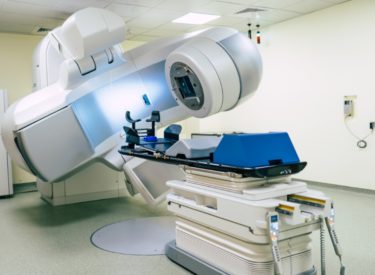Radiation Therapy (RT)
Standard of care is a medical treatment guideline. It specifies appropriate treatment based on scientific evidence for any given condition. The only approved standard of care for DIPG/DMG is radiation therapy (RT).
Proton and photon are two types of radiation therapy. Both types are beneficial for DIPG/DMG. There is no documented difference between proton or photon radiation for DIPG/DMG, so whatever can be offered sooner should be considered.
RT should begin as soon as possible after diagnosis in order to stall the progression of the tumor. Radiation usually causes the tumor to shrink, which could provide relief from many of the symptoms associated with the disease. RT is typically performed 5 days per week for 6-7 weeks or 30 treatments, also referred to as fractions.However, there would be another option for stronger radiation treatment for a shorter time period. You can discuss this with your radiation oncologist.
If considering a clinical trial, be sure to check with your medical team before starting radiation therapy, as it may impact trial eligibility.
There will be a planning session where a mask will be custom made to allow for accurate positioning of the head. Conscious sedation may be needed, depending on the age of the child, so the child can remain still during the treatments.
After radiation therapy has been completed, patients sometimes experience a “honeymoon period.” A honeymoon period provides the patient a temporary decrease in symptoms, allowing them to resume their regular activities.
Re-irradiation
Re-irradiation may be an option to consider and usually can be started approximately 6 months after the initial radiation is completed. Re-irradiation could be beneficial in lengthening survival. Your medical team can work with you to discuss this option.
Side Effects
Short-term side effects can happen during or shortly after treatment and usually lessen or resolve within a few weeks after treatment ends. The early side effects can include headache, nausea, vomiting, hearing loss, fatigue, skin changes, hair loss, brain fog, and mouth soreness.
The most common side effect that has been reported is fatigue. Fatigue occurs because radiation destroys some normal cells in addition to cancer cells. It can also get worse as treatment continues. It might not be unusual for your child to sleep most of the day. We encourage you to talk with your medical team if these symptoms occur.

